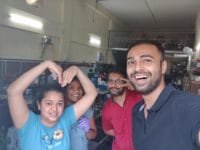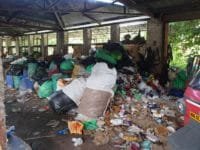Reimagining Waste for Good with Ashaya
While waste management is becoming a problem globally, India faces a significant waste issue, with 81% of waste left untreated and half of all waste generated dumped in landfills. In India (and many other countries), there is a reliable workforce dedicated to the business of waste collection and recycling - waste pickers (or 'kachra-vechak' in Marathi). They carry out critical waste collection and segregation tasks with minimal costs to the government and neighbourhood residents. Waste picking also provides millions of socioeconomically disadvantaged Indians with a livelihood. However, in return, India's waste pickers are exploited, undervalued, and stuck in a cycle of poverty.There are many local organizations in India working towards bettering the lives of the waste pickers, and Ashaya, founded by Anish Malpani, is one of them. Ashaya is a Pune-based social enterprise with bold plans - to increase the value of waste via technological innovations and fairly redistribute that value to stakeholders in the supply chain, especially those who are the poorest: waste pickers. Before founding Ashaya, Anish led a very different life. Born in India, raised in Dubai, and further educated in the US, he worked in Finance in New York before quitting the corporate world to pursue purpose in the social impact space. After a couple of years of hands-on research, learning, and non-profit work across the globe, he decided to start a social enterprise in India focused on multidimensional poverty. With that, Ashaya was born. We're all familiar with what poverty means, but the phrase 'multidimensional poverty' is less well-known, despite being a more accurate indicator of poverty. It believes that poverty is not simply a lack of money but also the heavy burden of multiple other disadvantages - for example, a lack of access to education, healthcare, and a decent standard of living. At this stage, Anish wasn't familiar with the specific plight of waste pickers in India and focused on answering a single question: who exactly are the poor in India? This might sound like a profound, philosophical question, but he searched for actionable, data-driven answers. Anish used data science to break out India's multidimensional poverty by occupation and was drawn to the waste management space for two key reasons: firstly, it employs some of the country's poorest people, and secondly, due to the untapped value in waste.
Before founding Ashaya, Anish led a very different life. Born in India, raised in Dubai, and further educated in the US, he worked in Finance in New York before quitting the corporate world to pursue purpose in the social impact space. After a couple of years of hands-on research, learning, and non-profit work across the globe, he decided to start a social enterprise in India focused on multidimensional poverty. With that, Ashaya was born. We're all familiar with what poverty means, but the phrase 'multidimensional poverty' is less well-known, despite being a more accurate indicator of poverty. It believes that poverty is not simply a lack of money but also the heavy burden of multiple other disadvantages - for example, a lack of access to education, healthcare, and a decent standard of living. At this stage, Anish wasn't familiar with the specific plight of waste pickers in India and focused on answering a single question: who exactly are the poor in India? This might sound like a profound, philosophical question, but he searched for actionable, data-driven answers. Anish used data science to break out India's multidimensional poverty by occupation and was drawn to the waste management space for two key reasons: firstly, it employs some of the country's poorest people, and secondly, due to the untapped value in waste. To begin with, Ashaya has intentionally chosen to focus on those types of plastic waste that are both recycled less and harder to recycle. They are currently working on post-consumer metalized multi-layered plastic packaging (think: chips packets), the least recycled type of plastic waste that generally winds up in landfills. This type of plastic waste is almost impossible to recycle. It contains 3-5 different materials combined (e.g. PET, aluminium, paper) and other contaminants like hair and food crumbs. Ashaya's near-term goal is to convert this waste into high-quality materials and products, and Anish hopes that they can launch their first product by the end of 2022. Once they've completed this initial goal and extracted a significant margin from the waste, the Ashaya team will use their profits to impact waste pickers and cross-subsidize the recycling of other low-value waste. Ashaya's eventual goal is to create local, decentralized recycling centres across India that upcycle all types of municipal solid waste, incorporate the informal waste picker industry, and thrive as financially sustainable, mini-manufacturing units (decentralized 'material cradles'). While Ashaya focuses on waste management, its three guiding principles - Impact First, Good Economics, and Long-Term Outlook apply to all systemic problems in our society. Most true social enterprises prioritize impact over everything else, but they still need to be financially viable organizations to make an impact and design solutions that concentrate on long-term progress. Despite being away from India for two decades, Anish feels at home in Pune and more Indian than ever before. He returned to India just before the pandemic and dealt with multiple setbacks for Ashaya due to Covid, yet his outlook remains cautiously optimistic. Above all, Anish's passion for a world without poverty is rousing and infectious, and you can't help but root for him and the Ashaya team.
To begin with, Ashaya has intentionally chosen to focus on those types of plastic waste that are both recycled less and harder to recycle. They are currently working on post-consumer metalized multi-layered plastic packaging (think: chips packets), the least recycled type of plastic waste that generally winds up in landfills. This type of plastic waste is almost impossible to recycle. It contains 3-5 different materials combined (e.g. PET, aluminium, paper) and other contaminants like hair and food crumbs. Ashaya's near-term goal is to convert this waste into high-quality materials and products, and Anish hopes that they can launch their first product by the end of 2022. Once they've completed this initial goal and extracted a significant margin from the waste, the Ashaya team will use their profits to impact waste pickers and cross-subsidize the recycling of other low-value waste. Ashaya's eventual goal is to create local, decentralized recycling centres across India that upcycle all types of municipal solid waste, incorporate the informal waste picker industry, and thrive as financially sustainable, mini-manufacturing units (decentralized 'material cradles'). While Ashaya focuses on waste management, its three guiding principles - Impact First, Good Economics, and Long-Term Outlook apply to all systemic problems in our society. Most true social enterprises prioritize impact over everything else, but they still need to be financially viable organizations to make an impact and design solutions that concentrate on long-term progress. Despite being away from India for two decades, Anish feels at home in Pune and more Indian than ever before. He returned to India just before the pandemic and dealt with multiple setbacks for Ashaya due to Covid, yet his outlook remains cautiously optimistic. Above all, Anish's passion for a world without poverty is rousing and infectious, and you can't help but root for him and the Ashaya team.
 Shalaka Laxman works as a Product Manager in London, focusing on developing sustainable financial products for large corporates. Before moving to London, she previously lived in New York and graduated with a B.S. in Commerce from the University of Virginia in 2014. Outside the day job, she writes a weekly newsletter with the latest developments in the sustainability space and runs By Shax, her own independent, conscious art and homeware brand. Shalaka grew up in Dubai before heading to the U.S. for university and enjoys reading, travelling, and all things cat-related, alongside time with family and friends.
Shalaka Laxman works as a Product Manager in London, focusing on developing sustainable financial products for large corporates. Before moving to London, she previously lived in New York and graduated with a B.S. in Commerce from the University of Virginia in 2014. Outside the day job, she writes a weekly newsletter with the latest developments in the sustainability space and runs By Shax, her own independent, conscious art and homeware brand. Shalaka grew up in Dubai before heading to the U.S. for university and enjoys reading, travelling, and all things cat-related, alongside time with family and friends.
